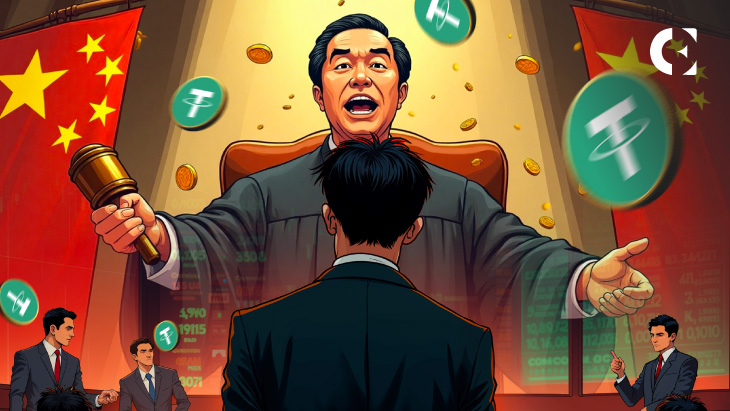- Xiao Yang was sentenced for laundering 120 million yuan through USDT transactions.
- As per the notice, the user processed nearly 10,000 crypto trades linked to fraud schemes.
- The recent case highlights China’s strict enforcement of virtual currency prohibitions.
A court in Sunwu County has ruled against a cryptocurrency trader identified as Xiao Yang, who facilitated money laundering operations through USDT (Tether) transactions. The case is one of 12 virtual currency-related proceedings heard by the court in 2024.
According to court documents, Xiao Yang used WeChat, an instant messaging app, to connect buyers and sellers of USDT, commonly referred to as “U-coins” in China. Operating with price differentials ranging from 1 to 6 cents compared to rates on the OKX exchange (formerly Ouyi), Xiao Yang processed transactions by forwarding payment information between parties and using his personal TP wallet as an intermediary.
Within three months, Xiao Yang processed nearly 10,000 USDT transactions involving almost 10,000 different payment accounts. During investigations, it was revealed that he processed more than 30.3 million USDT tokens and that the money value in the transactions was more than 120 million yuan (approximately $16.5 million). These operations generated illegal profits of more than 440,000 yuan (approximately $60,000) for Xiao Yang.
Related: South Korean Man Gets 7 Years for $311 Million Crypto Scheme Fraud
Further, it was discovered that Xiao Yang’s internet money services were linked to seven telecom fraud cases. His accounts received over 59,000 yuan in fraud money and assisted in transferring 116,000 yuan in money, which led victims to lose over 4.189 million yuan in scams. In total, Xiao Yang was found to have concealed criminal funds worth over 170,000 yuan.
Expressing Remorse Over Crime Could Reduce Punishment
The Sunwu Court ruled that Xiao Yang was guilty of concealing and disguising money as a crime and the court declared the case “serious” under Chinese law. Although he played a “minor role” as an accomplice to a larger crime, Xiao Yang received a criminal penalty and was fined. The court added that his decision to confess, express remorse, and return the illicit money could be considered as factors for reducing his punishment.
This case underscores China’s increasingly strict enforcement of its virtual currency prohibitions. On September 15, 2021, multiple Chinese authorities, including the People’s Bank of China, the Central Cyberspace Affairs Commission, the Supreme People’s Court, and the Supreme People’s Procuratorate, jointly issued a notice explicitly declaring virtual currency-related business activities as illegal financial operations that are “strictly prohibited and resolutely banned.”
Disclaimer: The information presented in this article is for informational and educational purposes only. The article does not constitute financial advice or advice of any kind. Coin Edition is not responsible for any losses incurred as a result of the utilization of content, products, or services mentioned. Readers are advised to exercise caution before taking any action related to the company.







